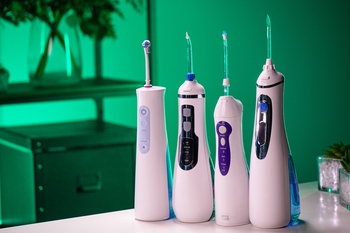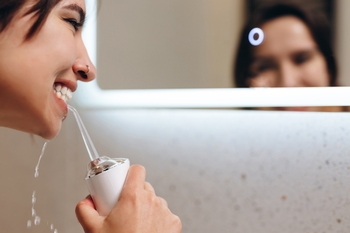“What is a water flosser?” you ask. While many people turn to traditional string floss as a primary means of interdental cleaning in pursuit of optimal oral hygiene, an alternative method could provide effective plaque removal and gum stimulation with added convenience. We are introducing the water flosser, a modern oral health appliance designed to complement standard dental floss and improve overall gum health.
What Is A Water Flosser?
A water flosser is a device that employs a focused stream of water to remove food particles, plaque, and germs from between teeth and along the gum line. It is also referred to as an oral irrigator or dental water jet. Unlike string floss, which involves manually sliding a thin string between teeth, a water flosser emits a pulsating water flow through a nozzle or flosser tip.
How Does A Water Flosser Work?
Water flossers typically consist of a reservoir, a motorised pump, and adjustable pressure settings. The reservoir stores water pumped through the device at varying intensities, allowing users to customise their flossing experience based on sensitivity and personal preference. As the water is expelled through the flosser tip, it creates a high-pressure stream capable of dislodging debris and stimulating gum tissue.
What To Use A Water Flosser For

Water flossers are versatile tools that can be used to enhance oral hygiene in a variety of situations. Here are some common applications:
Enhancing Traditional Flossing
While traditional dental floss remains a staple in oral care routines, some individuals find string flossing difficult or uncomfortable. Water flossers offer an alternative method for interdental cleaning, particularly for those with sensitive gums or dental work such as braces or bridges.
Removing Plaque And Food Debris
The pulsating water emitted by a flosser can effectively dislodge plaque and food particles from hard-to-reach areas between teeth and around dental appliances. This helps prevent bacterial buildup and reduces the risk of gum disease and tooth decay.
Improving Gum Health
Regular water flosser use can improve gum health by stimulating circulation and promoting tissue regeneration. By massaging the gum line with a targeted stream of water, users may experience reduced inflammation and a lower incidence of gingivitis.
Supporting Orthodontic Treatment
Individuals undergoing orthodontic treatment often face challenges maintaining oral hygiene due to the presence of brackets and wires. A water flosser can facilitate more thorough cleaning around braces, helping to prevent plaque accumulation and white spot lesions.
Added Health Benefits
In addition to its primary role in oral hygiene, using a water flosser has been associated with several secondary health benefits. These include reducing the risk of cardiovascular disease by minimising oral inflammation and promoting overall well-being through good oral health practices.
When To Use Water Flossers
Knowing when to use a water flosser can help maximise its benefits and integrate it seamlessly into your oral hygiene routine.
Morning Routine
Many individuals use a water flosser as part of their morning routine, alongside tooth brushing. Flossing in the morning helps remove plaque and debris that may have accumulated overnight, giving you a fresh start to the day and promoting good oral health.
After Meals
A water flosser after meals can help remove food particles trapped between teeth and prevent plaque and bacteria buildup. This can be particularly beneficial after consuming sticky or sugary foods that are more likely to adhere to dental surfaces.
Before Bed
Flossing with a water flosser before bed is an excellent way to thoroughly clean your teeth and gums before sleeping. Removing plaque and debris before bedtime helps prevent bacterial growth overnight and reduces the risk of developing cavities and gum disease.
After Orthodontic Adjustments
Individuals undergoing orthodontic treatment may find using a water flosser after orthodontic adjustments helpful. This can help flush out any food particles lodged around braces or wires, reducing the risk of decay and irritation.
When You Have Difficulty With Traditional Flossing
If traditional flossing with dental floss or interdental brushes is challenging or uncomfortable, a water flosser can provide an alternative interdental cleaning method. Its gentle yet effective stream of water can reach tight spaces and stimulate gum tissue without causing discomfort.
When to use a water flosser depends on individual preferences and oral health needs. Whether incorporated into your morning routine, after meals, before bed, or after orthodontic adjustments, regular use of a water flosser can contribute to better oral hygiene and improved gum health. Experiment with different times of day to find what works best for you, and make water flossing a consistent part of your daily oral care regimen.
Frequently Asked Questions

Are water flossers effective for plaque removal?
Indeed, water flossers work wonders at getting rid of dirt and plaque from between teeth and along the gum line. The pulsating water stream helps dislodge particles that traditional flossing may miss.
Can water flossers replace traditional flossing?
While water flossers offer an alternative interdental cleaning method, they are not intended to replace traditional dental floss entirely. Instead, they can complement standard flossing to provide a more thorough oral hygiene routine.
How often should I use a water flosser?
A water flosser should be used once a day as part of a comprehensive oral care regimen. It can help you prevent gum disease and maintain good oral health by becoming a part of your routine.
What are the benefits of using a water flosser?
Using a water flosser offers numerous benefits, including improved plaque removal, enhanced gum health, and increased convenience compared to traditional flossing methods. Additionally, water flossers can be particularly useful for individuals with braces, dental work, or sensitive gums.
Can children use water flossers?
Yes, water flossers can be used by children, but it’s essential to supervise them to ensure they use the device correctly and safely. Some water flossers may have specific age recommendations, so it’s best to consult with a dental professional if you need clarification.
Can water flossers help with bad breath?
Yes, by clearing food particles and germs from between teeth and along the gum line, water flossers can help minimise foul breath. Incorporating a water flosser into your oral hygiene routine can contribute to fresher breath and improved oral health.
Can I use mouthwash with a water flosser?
Yes, you can use mouthwash with a water flosser to enhance your oral hygiene routine. Some water flossers even have built-in compartments for adding mouthwash to the water reservoir, providing an extra layer of freshness and antimicrobial protection.
Can people with dental work use water flossers?
Yes, water flossers can be safely used by individuals with dental work such as crowns, bridges, or implants. Water flossers can help clean around dental work more effectively than traditional flossing methods, reducing the risk of plaque buildup and gum disease.
Obtaining Your High-Quality Water Flosser
A water flosser is valuable for improving oral hygiene and promoting gum health. It provides a practical and efficient substitute for conventional flossing by utilising the force of pulsing water. For a healthy smile, consider adding a water flosser to your routine if you have trouble with string flossing or want to improve your dental hygiene practice.
Contact Infinity Dental Care, Winston Hills NSW 2153, at (02) 9159 6237 to get your water flosser!
Sources
Lin, Steven, DDS. “Is Water Flossing Better Than String Flossing?” Verywell Health, 5 Mar. 2023, www.verywellhealth.com/is-water-flossing-better-than-string-flossing-4137725.
Roberts, Catherine. “How Well Do Water Flossers Like Waterpik Work?” Consumer Reports, 21 Sept. 2022, www.consumerreports.org/health/dental-oral-care/how-well-do-water-flossers-like-waterpik-work-a9643535742.
“Use of a Water Flosser for Interdental Cleaning.” PubMed, 1 Dec. 2011, pubmed.ncbi.nlm.nih.gov/22167932.
“What Is a Water Flosser and Its Benefits?” Oral-B, oralb.com/en-us/oral-health/why-oral-b/floss/what-is-water-flosser-benefits.
Whelan, Corey. “Waterpik Vs. Flossing: Pros and Cons.” Healthline, 19 May 2023, www.healthline.com/health/dental-and-oral-health/waterpik-vs-flossing.

